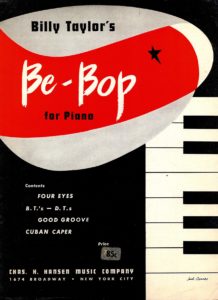Billy Taylor: I Wish I Knew How It Would Feel To Be Free
Billy Taylor was a living refutation of the stereotype of jazz musicians as unschooled, unsophisticated and inarticulate, an image that was prevalent when he began his career in the 1940s, and that he did as much as any other musician to erase.
Dr. Taylor probably had a higher profile on television than any other jazz musician of his generation. He had a long run as a cultural correspondent on the CBS News program “Sunday Morning” and was the musical director of David Frost’s syndicated nighttime talk show from 1969 to 1972.
Well educated and well spoken, he came across, Ben Ratliff wrote in The New York Times in a review of a 1996 nightclub performance, as “a genial professor,” which he was: he taught jazz courses at Long Island University, the Manhattan School of Music and elsewhere. But he was also a compelling performer and a master of the difficult art of making jazz accessible without watering it down.
His “greatest asset,” Mr. Ratliff wrote, “is a sense of jazz as entertainment, and he’s not going to be obscure about it.”

A pianist with impeccable technique and an elegant, almost self-effacing style, Dr. Taylor worked with some of the biggest names in jazz early in his career and later led a trio that worked regularly in New York nightclubs and recorded many albums. But he left his mark on jazz less as a musician than as a proselytizer, spreading the gospel of jazz as a serious art form in high school and college lectures, on radio and television, on government panels and foundation boards.
He also helped bring jazz to predominantly black neighborhoods with Jazzmobile, an organization he founded in 1965 to present free outdoor concerts by nationally known musicians at street corners and housing projects throughout New York City.
“I knew that jazz was not as familiar to young blacks as James Brown and the soul thing,” he told Barbara Campbell of The Times in 1971. “If you say to a young guy in Harlem, Duke Ellington is great, he’s going to be skeptical until he has seen him on 127th Street.”
Dr. Taylor had the technique, the knowledge and the temperament to straddle the old and the new; his adaptability made him a popular sideman with both swing and bebop musicians and led to his being hired in 1949 as the house pianist at Birdland.
In 1951 he formed his own trio, which was soon working at clubs like the Copacabana in New York and the London House in Chicago. Within a few years he was lecturing about jazz at music schools and writing articles about it for DownBeat, Saturday Review and other publications. He later had a long-running concert-lecture series at the Metropolitan Museum of Art.
He also became one of the few jazz musicians to establish a successful separate career in radio and television. In 1958 he was the musical director of an NBC television show, “The Subject Is Jazz.” A year later the Harlem radio station WLIB hired him as a disc jockey; in 1962 he moved to WNEW, but he returned to WLIB in 1964 as both disc jockey and program director, and remained in those positions until 1969. He was later a founding partner of Inner City Broadcasting, which bought WLIB in 1971.
Easy Download Jazz sheet music
Commercial radio became increasingly inhospitable to jazz in the 1960s, but Dr. Taylor found a home at National Public Radio, where he was a familiar voice for more than two decades, first as host of “Jazz Alive” in the late ’70s and most recently on “Billy Taylor’s Jazz at the Kennedy Center.” That series, on which he introduced live performances and interviewed the performers, made its debut in the fall of 1994 and remained in production until the fall of 2002.
Dr. Taylor wrote more than 300 compositions. They ranged in scope and style from “I Wish I Knew How It Would Feel to Be Free,” a simple 16-bar gospel tune written with Dick Dallas that became one of the unofficial anthems of the civil rights movement in the 1960s, to the ambitious “Suite for Jazz Piano and Orchestra” (1973).
As much energy as his other activities required, Dr. Taylor never lost his enthusiasm for performing — or his frustration with audiences that, as he saw it, missed the point. “Most people say, ‘Hey, let’s go to the nightclub and have a few drinks, and maybe we’ll even listen to the music,’ ” he once said. “It’s a lack of understanding of the musicians and of the discipline involved.
“This is not to say that playing jazz is all frowning and no fun at all. But because you make it look easy doesn’t mean you didn’t spend eight hours a day practicing the piano.”
